Daily Life
Weekend Reset: A Routine to Recharge Your Mind and Body

In the hustle of everyday life, our minds and bodies often operate in overdrive mode, pushing through back-to-back meetings, assignments, errands, and endless to-do lists. By the time the weekend arrives, many of us are not just tired we’re mentally exhausted and physically drained. The weekend, however, offers a golden opportunity to pause, reset, and restore our energy for the week ahead. A well-structured weekend reset isn’t about productivity or squeezing more activities in; it’s about intentionally engaging in practices that relax your body, clear your mind, and rekindle your motivation. When approached with care and purpose, a weekend reset can transform your mood, improve focus, and cultivate long-term well-being. This article outlines a powerful weekend reset routine to help you recharge deeply and return to your weekdays with renewed clarity and vitality.
Start with a Slow, Restorative Morning
The beauty of the weekend lies in its slower pace. Instead of jolting awake to alarms or racing into obligations, allow yourself to begin the day gently. Sleep in if your body needs the rest, and wake up without rushing. Step into the day with intention drink a warm glass of water, open your windows for fresh air, and take a few minutes to stretch or sit in silence. Avoid jumping onto your phone or checking emails; let your morning be sacred. A nourishing breakfast, perhaps with whole grains, fruit, or a warm drink, can set the tone for comfort and healing. This calm start grounds your nervous system, quiets the mental chatter, and gives your body permission to ease into the day. Weekend mornings don’t need to be packed—they should be peaceful.
Reflect and Reconnect Through Journaling or Meditation
A weekend reset is a chance to check in with yourself emotionally and mentally. Carve out 15–30 minutes for reflection. Journaling is a powerful way to get your thoughts out of your head and onto paper. Write about how you’ve been feeling, what went well during the week, and what drained you. Acknowledge your wins, your struggles, and any lingering stress. If journaling doesn’t appeal to you, try a short guided meditation or breathing exercise. Even five minutes of focused breathing can lower cortisol levels and create a feeling of calm. This practice of inner reconnection is the foundation of a meaningful reset. It brings awareness to your patterns, helps you identify what needs to shift, and creates space for gratitude and clarity to emerge.
Tidy Your Space to Clear Mental Clutter
A cluttered space often mirrors a cluttered mind. Taking time on the weekend to reset your physical environment can make a dramatic difference in how you feel. Focus on small but impactful tasks: make your bed, do a quick sweep of your living area, clear off surfaces, and put away items that have gathered during the week. You don’t need to deep clean your whole home just restore order and cleanliness to the spaces you spend the most time in. Light a candle or diffuse essential oils to bring a fresh scent and calming energy into your space. When your home feels clean, organized, and intentional, your mind will follow. Physical tidiness creates a mental reset, making you feel more relaxed and in control.
Move Your Body in a Way That Feels Good
The weekend is a great time to reconnect with your body, but not through grueling workouts or punishing routines. Instead, choose gentle, enjoyable movement that uplifts your spirit and relieves tension. This could be a walk in the park, a light yoga session, dancing to your favorite music, or even simple stretching on your living room floor. Moving your body enhances circulation, releases endorphins, and breaks up the stagnancy that often comes from sedentary weekday habits. The goal isn’t to burn calories—it’s to feel energized and alive. Listen to your body’s needs and move in a way that feels intuitive. Physical activity, when done with joy and care, becomes a powerful part of your weekend recharge.
Unplug to Reconnect
We spend much of the week glued to our devices checking updates, responding to messages, scrolling through content. A weekend reset gives you permission to unplug. Take a few hours, or even an entire day, to detach from screens. Put your phone on “Do Not Disturb” and engage with the world around you. Go outside, read a physical book, cook a meal from scratch, or enjoy face-to-face time with a loved one. This digital detox helps reset your brain’s overstimulated reward systems and brings you back into the present moment. Being offline also increases your creative thinking, reduces anxiety, and improves your sleep. When you unplug from the noise, you make space for calm and connection—the very heart of what a reset should offer.
Nourish Your Body with Wholesome Meals
Weekends are an ideal time to reset your eating habits and reconnect with food in a mindful, nourishing way. Instead of relying on quick fixes or takeout, plan and prepare simple, wholesome meals made from fresh ingredients. Cooking at home can be a therapeutic experience chopping vegetables, sautéing aromatics, and plating your food with intention turns nourishment into a sensory ritual. Eat slowly, savor each bite, and be present with your meal. Drink plenty of water throughout the day, and consider herbal teas to support digestion and relaxation. Avoid overindulging or restrictive dieting—balance and satisfaction are key. What you eat directly affects your energy, focus, and emotional well-being. A weekend of mindful eating helps your body reset and supports a smoother transition into the new week.
Do Something Joyful and Creative
Rest isn’t just about doing nothing it’s also about doing what brings you joy. Use your weekend to indulge in something creative or playful that you rarely have time for. This might mean painting, playing music, writing, gardening, baking, or simply sitting outside with a cup of tea and letting your mind wander. Engaging in joyful activities fills your emotional cup and reawakens your sense of wonder. Creative play lowers stress and reconnects you to your authentic self. You don’t need to be productive or perfect—just present. Let go of the need to perform, and instead allow yourself to enjoy the process. This infusion of joy and creativity becomes the soul of your weekend reset, recharging you in a way that passive rest cannot.
Plan Lightly for the Week Ahead
As your weekend reset winds down, take a few minutes on Sunday evening to glance ahead. This doesn’t mean planning every hour or overloading your calendar it’s about preparing your mindset. Review your schedule, set one or two clear priorities, and think about how you want to feel during the week. Maybe you write down an intention or choose one habit to focus on. Perhaps you prepare your meals or outfits for Monday, or you simply make a to-do list to keep your mind at ease. Planning lightly gives you a sense of control and readiness without stress. It bridges the calm of your weekend with the responsibilities of your weekday, helping you stay grounded as you return to your routine.
Conclusion: Resetting Is Essential, Not Optional
A weekend reset isn’t a luxury it’s a necessity for sustained well-being. We are not machines built to run non-stop. Our minds, bodies, and hearts need time to decompress, release stress, and find stillness. By creating a weekend ritual that restores your energy and clears your mental space, you invest in your long-term health, happiness, and productivity. The reset doesn’t need to be perfect or rigid. Even small, consistent steps—like quiet mornings, nourishing meals, joyful movement, and moments of reflection—can profoundly transform how you feel. Ultimately, the weekend is your opportunity to reconnect with yourself, restore balance, and return to the world recharged and aligned. So take it. Make space. And reset with intention—because a better week begins with a better weekend.
Daily Life
10-Minute Morning Routine for Busy People

10-Minute Morning Routine for Busy People
In the fast-paced world we live in, finding time for an elaborate morning routine can seem like a luxury reserved for the few. But even if your mornings are packed with responsibilities, meetings, or family obligations, a 10-minute morning routine can still be powerful and transformative. The goal is not to cram everything into those few minutes, but to establish a focused sequence of habits that help you ground yourself, enhance mental clarity, and start the day with purpose. A well-structured 10-minute morning routine doesn’t require waking up at 5 a.m. or performing a dozen self-care rituals — it’s about making intentional choices that support your well-being, even in a short amount of time.
Start with Deep Breathing and Grounding (1 Minute)
The first minute of your day should not involve checking your phone or rushing to your inbox. Instead, begin with one minute of mindful breathing. As you wake up, sit up in bed or stand near a window, and inhale deeply through your nose for four seconds, hold for four, and exhale slowly for six. This controlled breathing helps regulate your nervous system, calms your thoughts, and transitions your brain from sleep mode to alert awareness. This simple grounding exercise doesn’t just relax your mind — it signals your body to wake up gently and intentionally. Starting the day in a centered state sets a much better tone than diving into distractions or stress.
Hydrate Immediately (1 Minute)
After hours of sleep, your body is dehydrated. Drinking a glass of water as soon as you wake up rehydrates your cells, jumpstarts your metabolism, and boosts cognitive function. This minute-long habit may seem minor, but it’s essential. Adding a squeeze of lemon or a pinch of sea salt can increase the hydration benefits and support digestion. Avoid reaching for coffee before drinking water — hydration first ensures you’re nourishing your body, not stressing it. This quick act tells your brain that your health matters, even if time is limited.
Quick Movement to Wake the Body (2 Minutes)
You don’t need a full workout in the morning, but just two minutes of movement can increase blood flow, reduce stiffness, and improve mood. A short series of stretches, jumping jacks, push-ups, or sun salutations can energize your body without requiring any equipment. This movement doesn’t just wake your muscles — it also releases endorphins that can shift your mindset from groggy to motivated. Think of it as a physical reset button that shakes off sleep and brings you into an active state of readiness for the day ahead.
Mental Clarity with a Mini To-Do Review (3 Minutes)
Take three minutes to get clear on what needs to happen today. You don’t have to write a full planner spread — just identify your top three priorities. This could be as simple as writing them down on a sticky note or saying them out loud. Focus on tasks that are important rather than just urgent. By doing this, you avoid feeling scattered or reactive, and you step into the day with a clear intention. When your mind knows what matters most, it becomes easier to navigate distractions and make better decisions. This habit also reduces overwhelm, because it frames your day in a way that feels manageable and purposeful.
Positive Affirmations or Gratitude Reflection (2 Minutes)
Your mindset in the morning often dictates the energy you carry throughout the day. Spend two minutes practicing positive affirmations or reflecting on gratitude. You can say something like, “I am capable of handling whatever comes my way today,” or “Today is a fresh start, and I choose positivity.” If affirmations feel awkward, simply think of three things you’re grateful for — no matter how small. Practicing gratitude shifts your focus from what’s lacking to what’s already working in your life. It helps you tap into a sense of abundance, resilience, and peace before diving into external pressures.
Optional Bonus: Silence or Nature Exposure (1 Minute)
If you have a balcony, a window with sunlight, or even access to fresh air, step outside or sit quietly for one more minute. Allow yourself to just exist without doing anything. Let your thoughts settle. This single minute of silence or nature exposure helps you reconnect with the world outside your phone or obligations. It reminds you that before the meetings, errands, and chaos, you are a human being who deserves stillness. This micro-moment of peace can feel incredibly nourishing, especially if your day is non-stop.
The Secret to Making It Work: Consistency and Simplicity
The effectiveness of a 10-minute routine doesn’t depend on how much you do — it’s about how consistently you do it. The goal isn’t perfection but repetition. When you design a short, manageable morning routine that you can actually stick to, you build momentum and discipline without burning out. Over time, this small investment in yourself will yield big returns in your productivity, emotional stability, and physical wellness. Simplicity is your best ally here. Don’t overthink it — just commit to showing up for 10 intentional minutes every morning. That’s enough to create a positive ripple effect throughout your entire day.
Conclusion: A Morning Routine for Real Life
Busy schedules and demanding lifestyles don’t have to mean sacrificing self-care or mental clarity. A 10-minute morning routine offers a practical, realistic way to ground yourself before the whirlwind begins. By focusing on breathing, hydration, movement, mental clarity, and positive intention, you can turn even the most hectic mornings into an opportunity for self-alignment and strength. It’s not about how early you wake up or how much you squeeze in — it’s about starting your day with presence, purpose, and self-respect. When you make time for yourself first, you move through the rest of the day with more energy, resilience, and calm.
Daily Life
Why You Should Never Skip Making Your Bed

Why You Should Never Skip Making Your Bed
Making your bed each morning might seem like an insignificant task, something easily brushed off in the hustle of daily life. Yet, this small act has a surprisingly profound impact on your mindset, productivity, and overall well-being. It’s more than just a neat appearance — it’s a habit that sets the tone for your entire day. From psychological benefits to cleanliness and discipline, making your bed is a foundational ritual that can support your goals and bring a sense of order into an otherwise chaotic world. In a time when we’re constantly seeking efficiency and mental clarity, this five-minute routine is one of the easiest ways to begin your day with intention.
A Simple Act That Starts a Chain Reaction
One of the most powerful reasons to make your bed in the morning is the domino effect it has on the rest of your day. Accomplishing this first small task gives you a quick win — it sends a message to your brain that you are organized, capable, and in control. This initial success sets a positive momentum, making you more likely to complete other tasks and follow through with your intentions throughout the day. Psychologists often refer to this as the “keystone habit” — a behavior that can trigger widespread change in other areas of life. When you make your bed, you’re not just tidying up your room — you’re also priming your mind for discipline, responsibility, and achievement.
A Clean Environment Supports a Clear Mind
Your surroundings have a direct impact on your mental state. Walking into a room with a rumpled, unmade bed can subconsciously contribute to feelings of disorder and stress, especially if your day has already been demanding. On the other hand, a neatly made bed instantly brings a sense of calm and cleanliness to your space. It visually signals that your home — and by extension, your life — is in order. This is especially important if you work from home or spend a lot of time in your bedroom. By starting the day with a clean slate, you give yourself the mental clarity needed to make better decisions and stay focused, productive, and emotionally balanced.
Making the Bed Strengthens Discipline and Routine
Discipline is built through consistent action, and making your bed is a low-barrier activity that reinforces self-discipline every single morning. Even on days when you feel tired, unmotivated, or overwhelmed, pushing yourself to complete this one task is an exercise in resilience. Over time, this small act becomes a symbol of your commitment to order, habit-building, and personal growth. It teaches you that even when things feel out of control, there is always something you can do to bring structure back into your day. This sense of discipline can spill over into more challenging areas of your life, such as fitness, career goals, or financial planning.
It Improves Sleep Hygiene and Nighttime Routine
Making your bed in the morning directly contributes to a better nighttime routine. A neatly made bed feels more inviting at the end of the day, signaling to your brain that it’s time to rest and recover. Climbing into a clean, organized sleeping space can actually improve your sleep quality and make it easier to wind down. Your brain forms associations with your environment, so if your bed looks chaotic, your mind may struggle to relax. On the contrary, returning to a well-made bed helps create a sleep-conducive environment that promotes comfort, peace, and better rest. It may seem minor, but this habit supports a full cycle of good sleep hygiene — from how your day starts to how it ends.
It Teaches Attention to Detail and Personal Pride
Taking a few extra minutes to smooth the sheets and fluff the pillows may not change the world, but it does develop an eye for detail. In a world filled with distractions and shortcuts, attention to the little things can make a big difference in your personal and professional life. By making your bed neatly, you’re training yourself to care about how things are done, not just whether they get done. This habit instills a quiet sense of pride — it’s a reminder that you value yourself enough to maintain your space, even if no one else will see it. That personal pride becomes a foundation for how you carry yourself throughout the day, how you treat others, and how you approach responsibilities, no matter how big or small.
It’s a Moment of Mindfulness in a Rushed World
In our fast-paced routines, it’s easy to feel like the day begins the moment you grab your phone or rush out the door. Making your bed offers a moment of pause and presence — a simple opportunity to be mindful. You can treat it as a meditative practice, focusing on each fold and tuck, the coolness of the sheets, and the comfort of the space you’re creating. This act can help you anchor your morning in calm awareness before external demands take over. Mindfulness doesn’t always require ten minutes of deep breathing; sometimes it’s found in the intention behind the most ordinary routines — like making your bed.
It’s Backed by Science and Endorsed by Experts
The habit of making your bed isn’t just anecdotal advice — it’s been championed by military leaders, motivational speakers, psychologists, and lifestyle experts alike. Admiral William H. McRaven famously declared in a commencement speech that if you want to change the world, start by making your bed. His point was that success starts with discipline and attention to the small things. Research also shows that people who make their beds report feeling more productive and better about their day. Surveys have indicated that regular bed-makers are more likely to report satisfaction with their jobs, home life, and sleep quality compared to those who leave it undone.
Conclusion: Small Habit, Big Impact
While it might be tempting to rush past the simple act of making your bed, skipping it means missing out on a key opportunity to anchor your day with purpose, order, and intention. This small gesture can bring structure to your morning, improve your mental clarity, and even influence your sleep and emotional well-being. In a world where big changes often feel overwhelming, the most transformative steps are often the smallest. By making your bed, you’re sending a powerful message to yourself: that you care about your space, your mindset, and how your day unfolds. So tomorrow morning, take the extra moment to make your bed — and start your day with a win.
Daily Life
How to Design a Morning Routine Based on Your Personality Type

How to Design a Morning Routine Based on Your Personality Type
Creating a morning routine isn’t a one-size-fits-all approach. What energizes one person might drain another, and the secret to an effective start to the day often lies in aligning your habits with your personality type. Whether you’re introverted or extroverted, detail-oriented or big-picture focused, your morning routine should reflect your natural tendencies. By customizing your routine to fit who you are, you can boost productivity, improve mood, and feel more in control of your day. Understanding your personality type — whether through frameworks like the Myers-Briggs Type Indicator (MBTI), the Big Five traits, or simply knowing how you function best — can serve as a foundation for building a powerful, energizing morning flow that sticks.
Why Your Personality Type Should Shape Your Routine
Personality influences behavior, energy levels, decision-making processes, and even how we recharge. An introvert may need solitude in the morning to feel centered, while an extrovert may thrive on interaction or auditory stimulation. People who are naturally structured and organized will likely benefit from a precise checklist or timed routine, whereas those who are spontaneous and creative may need more flexibility and freedom to explore what feels right each day. Ignoring these personal inclinations can lead to friction, burnout, or simply abandoning the routine altogether. By tuning into your personality type, you not only increase the likelihood of sticking to your morning habits, but also create a flow that feels intuitive, energizing, and sustainable over time.
Morning Routines for Introverts: Start Quiet, Stay Focused
If you’re an introvert, the early hours are best spent in calm, low-stimulation environments. You may find that jumping straight into social interactions, phone calls, or intense workouts leaves you feeling drained instead of energized. Instead, build a morning routine that prioritizes internal focus. Begin your day with silent meditation, journaling, or slow stretching. If you drink coffee or tea, enjoy it quietly without background noise. Reading something uplifting or inspirational can provide mental fuel without requiring you to engage externally. Plan your day using a private planner or app, and avoid emails or texts until later in the morning. Introverts tend to work best with structure, so having a consistent wake-up time and a ritualized process will help set the tone for a productive day.
Morning Routines for Extroverts: Energize Through Engagement
Extroverts often feel energized through external stimulation and social interaction, so their ideal morning routine will include ways to connect and activate their energy early. Starting the day with a high-energy workout or even dancing to music can help elevate mood and alertness. You might benefit from listening to a podcast or chatting with a friend or family member over breakfast. For extroverts, engaging with the world before starting work can help you feel more grounded and excited for the day ahead. Unlike introverts, extroverts may not need long stretches of solitude in the morning, so a more dynamic and flexible schedule can feel more natural. Make sure to include time for review of goals or a quick verbal affirmation session to keep motivation high.
Morning Routines for Planners and Organizers: Structure Is Power
For those who thrive on structure, routines that follow a detailed, step-by-step format are ideal. These personality types do best when their mornings are mapped out with time blocks and checklists. Start your day by reviewing your agenda, checking your calendar, and confirming your top priorities. A digital or physical planner can be a helpful companion. Consider including a specific amount of time for each task, such as 10 minutes for gratitude journaling, 20 minutes for a workout, and 15 minutes for news or current events. This group finds comfort and productivity in consistency, so replicating the same routine each day may enhance performance. The predictability provides a sense of control and reduces decision fatigue, allowing for a smoother transition into the workday.
Morning Routines for Free Spirits and Creatives: Flow Over Formula
Creative personalities or those who dislike rigid systems tend to resist highly structured routines. If this describes you, your morning routine should be more intuitive and changeable, based on your mood or energy levels. Instead of waking up to an alarm at the same time every day, consider giving yourself a range (like between 6:30 and 7:30 AM) and choosing activities that inspire you that morning. You might rotate between journaling, sketching, a nature walk, or playing music. Keep your workspace open and inspiring and allow your routine to evolve as needed. The key here is to avoid feeling trapped — instead of a schedule, think of your morning flow as a menu of nourishing options. This approach can help keep things fresh and engaging, which is crucial for those who thrive on novelty and spontaneity.
Morning Routines for Type A Personalities: Fuel for High Achievement
Type A individuals are driven, competitive, and thrive on accomplishment. For these personality types, a powerful morning routine should focus on high efficiency and goal alignment. Begin your day early with a short burst of physical activity, followed by reviewing your short- and long-term goals. Incorporate activities like cold showers, focused breathing, and productivity planning apps like Notion or Todoist. You might also include reading high-performance literature, listening to motivational speeches, or writing affirmations. Time is a key asset for Type A personalities, so your morning should be engineered to provide the most return on your energy investment. However, don’t forget to include short moments of mindfulness to help regulate stress and avoid burnout over time.
Morning Routines for Empaths and Emotionally Attuned Individuals
Highly empathetic and emotionally aware individuals need a peaceful, nurturing environment to thrive. Begin your morning with a calming atmosphere — light a candle, play soft instrumental music, and avoid the news or overwhelming digital inputs right away. Journaling your feelings or doing a guided meditation can help you reconnect with your center before engaging with others. Aromatherapy or nature walks may also ground your energy and uplift your mood. Since emotional well-being is crucial to how your day unfolds, pay attention to your emotional state each morning and design your activities to either soothe or inspire, depending on what you need most.
Tips to Tailor Your Morning to Any Personality
While everyone has unique preferences, there are universal strategies that can help any personality type create a more effective morning routine. First, avoid checking your phone immediately upon waking — this allows you to focus inward and set your own tone rather than reacting to outside demands. Second, ensure your environment supports your goals. Whether it’s keeping your journal by the bed or setting up a cozy nook for morning tea, physical cues can reinforce your routine. Third, experiment with your timing — not everyone thrives waking up at 5 a.m., and that’s okay. The goal is to find a wake time and sequence that aligns with your body’s rhythm and psychological comfort. Finally, track your energy and mood after different routines to see what works best, and adjust accordingly. Personal evolution is natural, and your morning routine should evolve with you.
Conclusion: Make Your Mornings an Expression of Who You Are
Designing a morning routine based on your personality type allows you to start your day with intention, clarity, and balance. Rather than forcing yourself into habits that don’t feel right, you’re aligning your energy and values with actions that feel natural and rewarding. Whether you crave structure or spontaneity, solitude or stimulation, your ideal morning routine already lives within you — it’s just waiting to be discovered. Take the time to experiment, reflect, and refine your routine until it becomes an authentic reflection of your personality. When your mornings are designed to suit your nature, the rest of the day becomes easier, more productive, and more joyful.
-

 Daily Life1 day ago
Daily Life1 day ago10-Minute Morning Routine for Busy People
-

 Daily Life1 day ago
Daily Life1 day agoWhy You Should Never Skip Making Your Bed
-

 Daily Life3 days ago
Daily Life3 days agoHow to Build a Morning Routine That Sets the Tone for a Productive Day
-

 Daily Life1 day ago
Daily Life1 day agoHow to Design a Morning Routine Based on Your Personality Type
-

 Daily Life3 days ago
Daily Life3 days agoTime Management Routine for Busy Professionals
-

 Daily Life3 days ago
Daily Life3 days agoSimple Daily Lifestyle Changes to Improve Your Mental Health
-

 Daily Life1 day ago
Daily Life1 day agoHow to Build a Bedtime Routine That Beats Insomnia
-

 Daily Life1 day ago
Daily Life1 day agoThe Science Behind Waking Up Early (and How to Do It)




